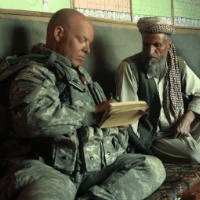KANDAHAR, Afghanistan -- Two years after its formation, a controversial military program to embed civilian social scientists inside combat units in Iraq and Afghanistan is scrambling to recover from a string of crises. How the so-called "Human Terrain System" responds to a spate of combat deaths and a disastrous employee pay cut will determine whether the program survives in its current form.
Human Terrain System, headquartered at Fort Leavenworth, in Kansas, is the brainchild of Montgomery McFate, a Harvard- and Yale-trained anthropologist. In a series of journal articles(.pdf) in 2005, McFate outlined the basic shape of what would become HTS. The organization's mission would be to "understand the people's interests, because whoever is more effective at meeting the interests of the population will be able to influence it," she told Wired magazine.
The underlying assumption is that civilians trained for cultural engagements are better equipped than soldiers to communicate with the local populations affected by U.S. wars. "I can get people to like me because I'm old," 57-year-old HTS member Ed Campbell told World Politics Review, only half-jokingly.

